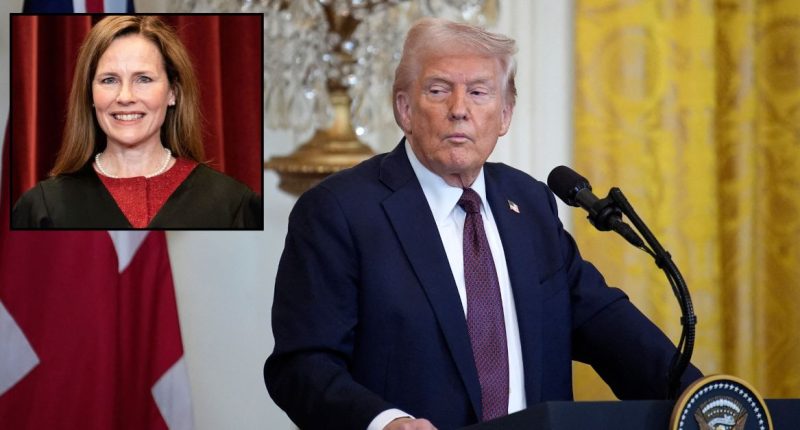![President Donald Trump at a press conference at the White House in Washington on February 27, 2025 (Yuri Gripas/Abaca/Sipa USA; AP Images); Inset: Associate Justice Amy Coney Barrett in Washington, DC on April 23, 2021. (ERIN SCHAFF/POOL/AFP via Getty Images]](https://am21.mediaite.com/lc/cnt/uploads/2025/02/Donald-Trump-Alex-Kaufman-Georgia-early-voting.jpg)
President Donald Trump at a press conference at the White House in Washington on Feb. 27, 2025 (Yuri Gripas/Abaca/Sipa USA; AP Images); Inset: Associate Justice Amy Coney Barrett in Washington, DC on April 23, 2021. (ERIN SCHAFF/POOL/AFP via Getty Images]
A coalition of foreign aid groups on Friday implored the U.S. Supreme Court to lift an emergency stay placed by Chief Justice John Roberts on a district court’s temporary restraining order (TRO) which would require the Trump administration to release nearly $2 billion in federal funds. Roberts issued the stay Wednesday evening, less than three hours before the district court-imposed deadline imposed on the administration.
“The government comes to this Court with an emergency of its own making,” plaintiffs wrote in the 24-page opposition filing to the government. “The district court gave the government every opportunity to demonstrate what steps it was taking to release foreign-assistance funding, as the TRO required, and to explain any practical impediments it faced in pursuing compliance. But even by the time of the district court’s February 25 hearing — nearly two weeks after the TRO had issued — government counsel could not identify a single action the government had taken in the twelve days since the TRO to release frozen funds.”
The plaintiffs — organizations who had entered into contracts or received grants from the U.S. Agency for International Development (USAID) and the State Department — earlier this month sued the Trump administration over an executive order that required a blanket freeze of all foreign aid funding, arguing that it was an unconstitutional exercise of presidential power “in contravention of congressional will” as well as an “arbitrary and capricious agency action” that will lead to starvation and the deaths of many.
Litigation in the highly-watched case has moved at lightning speed this week, beginning with an emergency hearing on Tuesday morning that led to the Supreme Court intervening by Wednesday evening.
The plaintiffs, for their part, believe the Trump administration should not even be allowed to argue for the stay with the Supreme Court, and used a 2024 concurrent opinion from Justice Amy Coney Barrett, to emphasize the point.
From the Friday filing:
The government’s application to vacate the district court’s minute order requiring compliance with a TRO of which it has never sought review is extraordinary. For one, the district court made clear that the February 25 order did not enlarge the scope of the government’s obligations under the TRO or its previous enforcement orders. A decision vacating the February 25 minute order therefore would not alter the government’s obligation to comply with the TRO. Review of a district court’s order directing compliance in this “very unusual procedural posture” is unheard of, and this Court “should not get into th[at] business.” United States v. Texas, 144 S. Ct. 797, 798 (2024) (Barrett, J., concurring).
Tuesday morning’s hearing concluded with U.S. District Judge Amir H. Ali finding that the government had failed to take “any meaningful steps” to abide by his temporary restraining order (TRO) prohibiting the implementation of the across-the-board funding freeze. He subsequently directed the administration to unfreeze funds and pay for work completed prior to the lawsuit being filed, setting a deadline of 11:59 p.m. on Wednesday.
The administration immediately filed a petition with the Circuit Court of Appeals in the District of Columbia seeking a short-term administrative stay on Ali’s order as well as a stay pending appeal. The administration asserted that it would be impossible for the government to abide by the directive within the allotted time frame, claiming that it could not pay out “nearly $2 billion in taxpayer dollars within 36 hours” unless it were to disregard its own payment-integrity systems.
After a three-judge panel on the D.C. appellate court declined to take up the case, Roberts at about 9:30 p.m. on Wednesday granted the government’s request for an administrative stay on Ali’s TRO, allowing the full court additional time to decide on the Trump administration’s request to block Ali’s TRO for the foreseeable future.
As the court decides how to proceed, plaintiffs in the case have repeatedly asserted that the pause in funding has been devastating.
Love true crime? Sign up for our newsletter, The Law&Crime Docket, to get the latest real-life crime stories delivered right to your inbox.
Plaintiffs, who are represented in the matter by the Public Citizen Litigation Group, argue that the Trump administration’s funding pause has led to “extraordinary and irreversible harm” to those around the world who depend on their work and “threaten the very existence” of companies and charities that have collaborated with the federal government for decades.
“Respondents have had to furlough or lay off employees, and some are facing cancellation of credit lines, civil and regulatory actions for employment violations, evictions, insolvency, and even physical threats to personnel in conflict areas,” plaintiffs wrote. “The government’s continued noncompliance with the district court’s TRO forced one respondent to lay off 110 employees yesterday. Another will default on severance obligations, triggering civil liability and potential regulatory enforcement, if it does not receive payment for past work by today. Meanwhile, many of those who depend on respondents’ programming face starvation, disease, and death.”
The court has not indicated when it will ultimately rule on Ali’s TRO.







